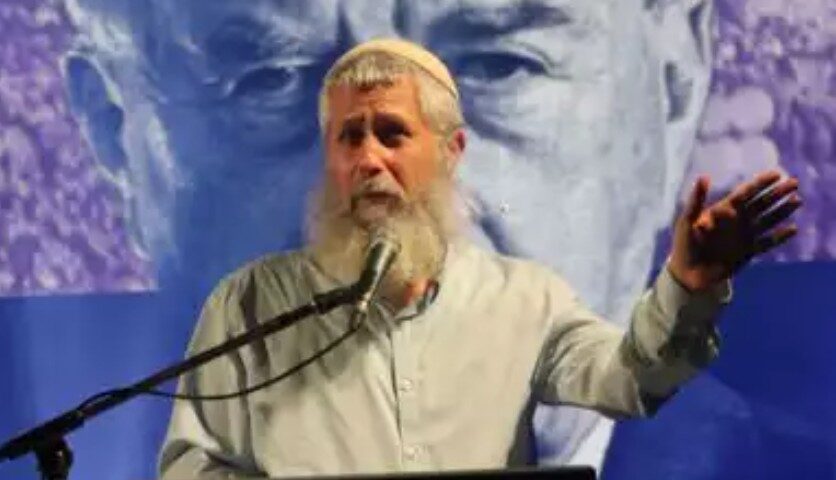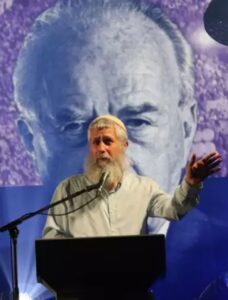Choose Hope & Responsibility

 Last week, marking the 30th anniversary of the assassination of Israel’s Prime Minister Yitzhak Rabin, all youth movements across Israel joined forces for the first time to unite thousands of youngsters at Mount Herzl for a joint memorial ceremony. This hopeful display of national unity on the part of Israel’s youth should serve as an example for its adults and its leadership. Among the speakers was Rabbi Tamir Granot, father of Amital z”l, who fell in battle in defense of the land and nation of Israel.
Last week, marking the 30th anniversary of the assassination of Israel’s Prime Minister Yitzhak Rabin, all youth movements across Israel joined forces for the first time to unite thousands of youngsters at Mount Herzl for a joint memorial ceremony. This hopeful display of national unity on the part of Israel’s youth should serve as an example for its adults and its leadership. Among the speakers was Rabbi Tamir Granot, father of Amital z”l, who fell in battle in defense of the land and nation of Israel.
Thirty-two years ago, in the winter of 1993, during the days of the Oslo Accords negotiations, I was a young student at Yeshivat Har Etzion. My revered teacher and Rosh Yeshiva, Rabbi Yehuda Amital, was a friend of Yitzhak Rabin. He trusted Rabin’s judgment and supported his path on deep moral grounds.
But his student—and one of the current Roshei Yeshiva—Rabbi Yaakov Medan, passionately opposed the Oslo. He launched a nationwide campaign called “Don’t Give Them Rifles” (i.e., the Arabs), and began a hunger strike in a tent set up in the center of Jerusalem.
And we, the young students, were confused. Who were we to support? Would the yeshiva be torn apart?
One of the formative moments of my life occurred when Rabbi Amital suddenly appeared at that protest tent. He walked inside, and all the students—including Rabbi Medan—rose to their feet in shock. Rabbi Amital said: “Please sit, Rabbi Yaakov, sit. You are my teacher. Although I disagree with you entirely, you are my teacher in your devotion to the people of Israel and the Land of Israel.”
In that moment, I learned the true meaning of Ahavat Yisrael. I learned how disagreement needn’t fragment us, but might strengthen us. And I received a gift: the gift of freedom. For when a person knows only one perspective, he cannot be free. But when he sees both sides in their full force—as two real possibilities—only then can he become a free human being.
This sacred mountain, Mount Herzl, includes three parts:
Yad Vashem, the memorial to the Holocaust, is the foundation of our covenant of fate—reminding us that if we are not united and ready to defend ourselves, we will not survive.
On the other side is the military cemetery, where my beloved son, Captain Amitai Granot, is buried—teaching us sacrifice, camaraderie, and brotherhood.
And here, in the center, among the graves of the founders and leaders of our nation, stand leadership and vision—the path to the covenant of destiny. Herzl knew the secret of hope (tikva): turning the future into the present, dream into reality.
Just as six million Jews were murdered in the gas chambers in terrible unity, without anyone asking which demonstration they attended…
Just as Israeli soldiers fight together, though one supported judicial reform and another marched at in protest against it—yet they give their lives for one another…
And just as Israel was founded by leaders with vastly different beliefs—liberal and nationalist, socialist and capitalist, religious and secular…
So must we walk together, in partnership, to defend our country and help her become what she deserves to be: A society all nations look to and say, “This is what a worthy society should look like.”
I express deep appreciation to all youth movements for choosing to stand together. This must serve as a model for our leaders and our media.
And now—we must raise the bar. Today, as we remember the assassination of Prime Minister Rabin, a low point in our national life, let us elevate our values.
Some say: We must teach tolerance. The Jewish people say: We must teach mutual responsibility. Tolerance means enduring the other; mutual responsibility means enduring for the other.
Some say: We must remain optimistic. The Jewish people say: Not optimism, but hope. Optimism expects good to happen; hope means believing that if we act together to repair the world then goodness is certain.
Some say: We must assign blame. I say: Not blame, but responsibility. Blame looks to the past; responsibility looks to the future. When we speak the language of blame, we point fingers at others. When we speak the language of responsibility, we say: Let us take responsibility together.
And to you—the rising generation—you have a mission:
Blame or responsibility.
Tolerance or mutual responsibility.
Division or partnership.
Passive optimism or active hope.
I ask you—as a society, as a people: Choose hope. Choose mutual responsibility.
And may we live here as one people—strong, responsible, filled with faith and hope.
Tamir Granot is Rosh Yeshiva of the Orot Shaul Yeshivat Hesder in Tel Aviv.
